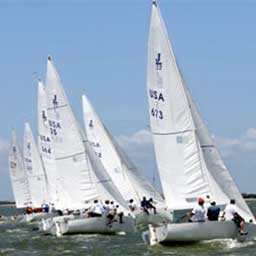International Rating Certificate (IRC)
Who Owns It
Royal Ocean Racing Club (RORC) and the Union Nationale pour la Course au Large (UNCL).
Why Did It Start
IRC was originally developed as the Channel Handicapping System to serve as a simplified measurement rule to suit cruiser/racers that were disenfranchised by the high performance racers of the International Offshore Rule (IOR) that had come to dominate racing in the UK and France in the 1980s.
What is IRC
IRC is a rating rule to handicap different designs of keelboats allowing them to race together; unlike a performance handicap a rating is not altered between races according to the individual boat’s performance, but is based on the physical measurements of the boat.
Each boat’s rating (her ‘handicap’) is calculated using measurements of the boat; her length, weight, draft, rig size, sail area, and specific characteristics and features. The resulting time corrector, the boat’s ‘TCC’, is her handicap. The higher the TCC figure, the faster the boat’s potential speed; IRC TCCs range from 0.750 to 2.000, with the majority of cruiser/racers between 0.900 and 1.100.
After a race, each boat’s elapsed time (the time she has taken to complete the course) is multiplied by her TCC to calculate her corrected time (her race time making allowance for the characteristics of the boat). The boat with the shortest corrected time is the winner of the race.
Who Uses It
IRC is used worldwide for a variety of inshore and offshore events including Cowes Week, RORC Caribbean 600, Voiles de St Tropez, Rolex Middle Sea Race, Rolex Sydney Hobart Yacht Race, and the Rolex Fastnet Race.
Where We Fit In
US Sailing is the IRC Rule Authority in the United States charged with the processing and issuing of all certificates in the United States.
Products
IRC certificates may be issued as either Standard (un-measured or partially measured) or Endorsed.
Endorsed Certificate
An Endorsed certificate is one where the weight and measurements have been verified or checked to ensure they don’t favor the boat. This usually involves some measurement, and possibly weighing although this is an option for production boats where good data is held by the Rating Authority.
Custom boats require full weighing and measurement.
To find out what would be required for your own boat, please contact US Sailing Offshore at offshore@ussailing.org.
There is no effect on rating simply by having an Endorsed certificate or not – the only effect is from any variation in data.
See the IRC Measurement page for more information on Standards & Process for Endorsement of IRC certificates.
Endorsed Certificate FAQ's
One Design Certificate
The IRC One-Design application can only be used for those boat classes that are designated IRC One-Design classes. Boats rated as one-design must comply with their class rules when racing.
Second Certificate
A boat may additionally hold a separate secondary valid certificate:
- The secondary certificate will be clearly identified and shall only vary from the primary certificate in respect of, mainsail widths, E, P, headsail dimensions, flying headsail dimensions, single furling headsail allowance, the use of stored power, SPA, STL, SPL, spinnaker pole/bowsprit, whisker pole, number of spinnakers, number of flying headsails, aft rigging, use of moveable ballast, use of variable ballast, internal ballast.
- The secondary certificate boat weight and corresponding overhangs shall only vary from the primary certificate for a change in internal ballast. This change in boat weight is only permitted when both the primary and secondary certificates are ENDORSED in accordance with IRC Rule 8.5.
- Owners shall declare the primary or secondary certificate to the race organizer before the rating deadline.
To learn more about IRC Secondary Certificates: Secondary Certificates
Amended Certificate
For boats currently holding a year valid certificate, any changes to the configuration must be reported and a new certificate reflecting those changes issued. For Endorsed certificates, relevant parameters may need to be measured.
Trial Certificate
These certificates provide information as to the rating a boat would receive for planned or projected changes. A Trial Certificate is NOT valid for racing. Please review IRC Policy for Trial Certificates.
Copy Certificates
Copies of currently valid IRC certificates are available through the Offshore office. The fee is $25/certificate for the first 10 purchased during a calendar year, $50 each for the second 10 and $100 each for the third 10. No more than 6 copies may be purchased for any one boat class/model per year. No more than 30 total may be purchased per year.
IRC Applications
Fill in all cells and answer all of the questions. Incomplete applications will delay processing. Save the application file with the BOAT NAME and Date as part of the file name. All applications should be emailed to offshore@ussailing.org in Excel format. Faxed, emailed pdf, jpeg, files in a format other than Excel, or mailed paper cannot be accepted or processed.
Payment
The contact person on the application form will be sent an invoice from Authorize.net on behalf of US Sailing's Offshore Office. The invoice often gets trapped in a spam or junk folder, so please look through these locations as well as your normal inbox. To pay the invoice follow the instructions in the email to pay with credit card, or e-check.
IRC Certificates, trials, and copies will only be sent to contact person once the invoice is paid in full.
For any questions regarding payment for IRC transactions please contact us as 401-342-7953 or email us at offshore@ussailing.org .
IRC Applications
IRC application links are coming soon. If you would like to apply for an IRC Certificate please contact US Sailing at offshore@ussailing.org or call as 401-342-7953.
Other Resources:
- IRC Rule
- IRC Rule Changes 2025
- RORC Website– Technical information and measurement drawings
- IRC Owner Measurement Preparation Guide
- IRC Photography for Ratings
- IRC Aft Rigging Types
- IRC Single Furling Headsail Allowance
- IRC TCC Listings





